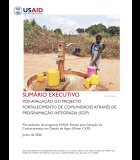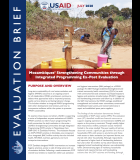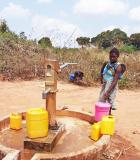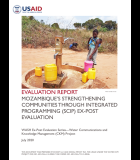Strengthening Communities through Integrated Programming – Zambezia & Nampula (SCIP)
The USAID-funded Strengthening Communities through Integrated Programming (SCIP) consortium was implemented in Nampula Province between August 1, 2009 and December 31, 2016. The project was implemented in 14 districts during the first five years; and in 15 districts during the last 18 months. SCIP successfully strengthened community and health systems to stimulate social behavior change, by reinforcing community and health services, and contributing to improved health outcomes while addressing social determinants of health through the integration of health; HIV & AIDS; water, sanitation, and hygiene (WASH); nutrition; and agriculture.
In Zambézia Province, the overarching goal of the 5-year project was to improve the health and livelihoods of women, children and families in Zambézia Province by pursuing an integrated, innovative, and sustainable community-based program supporting cross-sector integration of USAID's development actions in the province.
Activity Description
USAID supported WASH activities through the Strengthening Communities through Integrated Programming (SCIP) activity in the provinces of Nampula and Zambezia, where almost a third of the total population lives. These provinces suffer from the lowest access to protected water sources, with only about half the population able to access water in each province.
WASH activities under SCIP, implemented using the Community-Led Total Sanitation (CLTS) approach, included:
- Training water management committees to manage and promote safe water use to prevent diseases and respond effectively to waterborne epidemics, as well as to manage community water systems,
- Equipping local masons to build cement slabs for latrines,
- Spreading hygiene messages,
- Supporting community-led sanitation improvements, and
- Upgrading existing multi-use water sources or constructing new ones.
Expected Outcomes
- Develop and capacitate formal and informal community and social structures and networks which link community and health systems, provoking change in the ways that communities are involved in their health issues.
- Strengthen the link between the health and community systems, recognizing that the two are mutually determinant
- Build linkages among technical areas such as agriculture and WASH that also influence health.
Actual Outcomes
- Increased mCPR from 7.2% (2010 SCIP baseline) to 17.6% (2014 SCIP endline) (Nampula)
- Improved institutional delivery coverage (58% in 2010 vs. 85% in 2015) accompanied by a reduction in the institutional maternal mortality rate from 177 (2009) to 113 (2015) per 100,000 women of reproductive age
- Reduction of the low birth weight rate from 13.1% (2009) to 2.8% (2015) (Nampula)
- The decline of acute malnutrition rates from 8% in March 2014 to 1.7% in December 20154 in SCIP Nutrition districts (Nampula)
- Expanded access to potable water from 32.7% (2010 SCIP baseline) to 61.4% (2014 SCIP endline) (Nampula).






